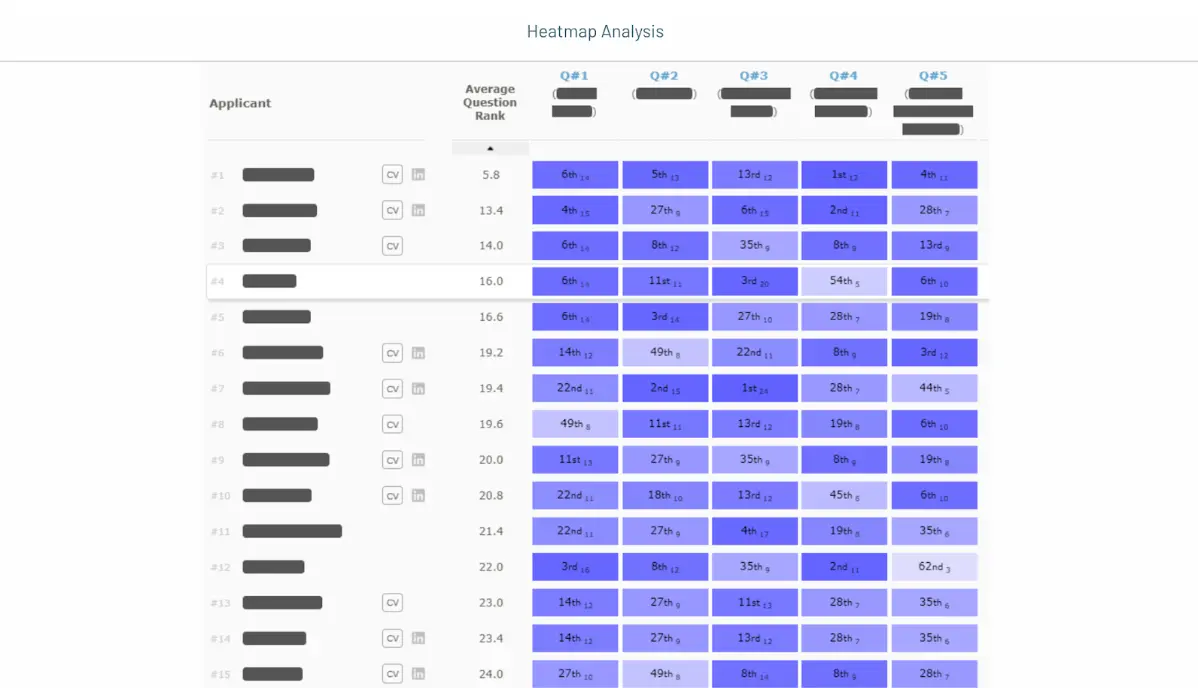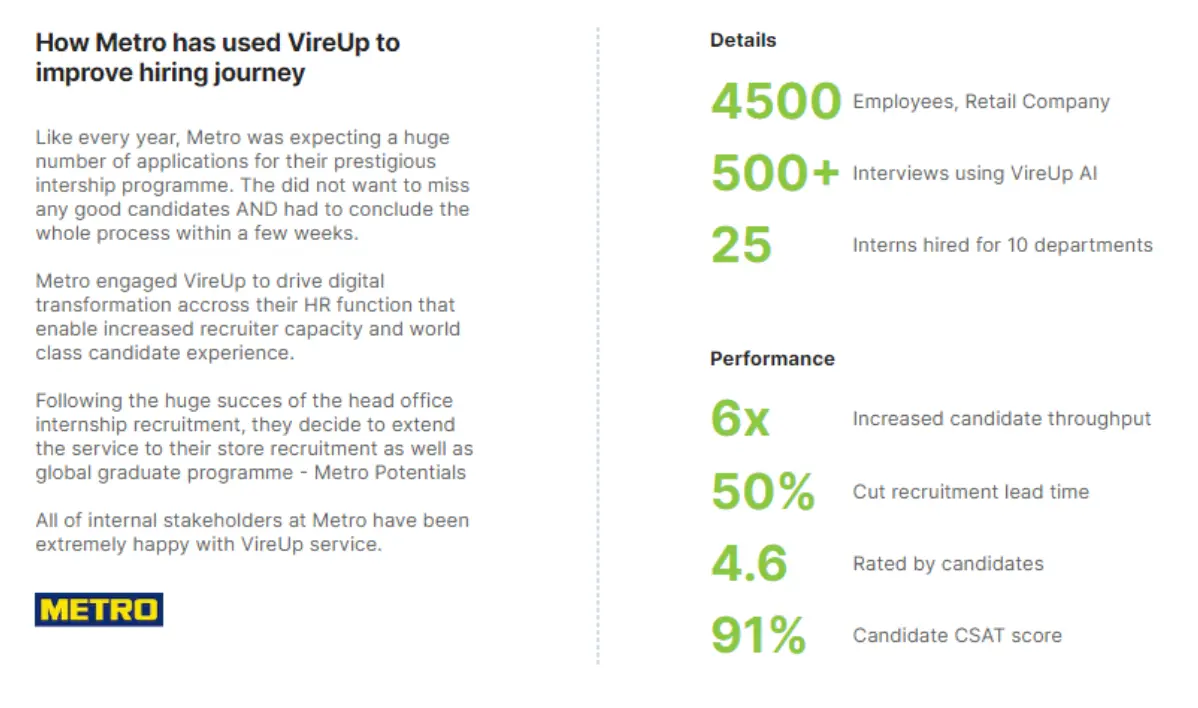In 2021, it took, on average, 65 days to recruit and hire for a standard professional position, and according to the data from the previous years, time-to-hire keeps increasing each year.
Therefore, any tool that can streamline the hiring process while saving time and money is more than welcome.
The easiest tool you can start using is a candidate evaluation form – a single document that helps you gather all candidate information in one place.
Evaluation forms can help you make more informed decisions, avoid unconscious bias, and hire the best candidates while keeping all candidate information in one place.
Keep reading to find interview evaluation form examples, templates, and tips for each section.
What is an interview evaluation form?
A candidate interview evaluation form is a tool that helps interviewers assess and capture the suitability of a job candidate according to predetermined criteria.
You can use them during or immediately after the interview to systematically record the interviewee's performance, level of qualifications, and overall adequacy for the position.
These forms help organize your thoughts and facilitate comparative analysis of candidates during the decision-making process. This is particularly valuable when interviewing multiple candidates for a single role, as the structured format provides a clear framework for evaluating each candidate and ensures consistency.
Many evaluation forms incorporate a numerical scoring system for specific categories, allowing interviewers to assign scores to candidate's desired qualifications or skills.
This numerical approach streamlines the review of a candidate's strengths, weaknesses, and performance relative to the other candidates.
Candidate interview evaluation form: What to include

Candidate interview evaluation form
The exact sections of your interview evaluation forms may depend on your specific evaluation criteria, but here are some categories that recruiters often include:
Education
Appropriate educational qualifications are a prerequisite for many job roles. You can rate the candidate's formal educational level, certifications, training certificates or other areas of expertise on a scale from one to five and leave additional comments.
Depending on the strictness of the education requirements in your field, questions may go into detail, such as the candidate's graduate school, the type of degree pursued, or the degree's level.
However, you should be mindful to avoid bias, knowing that prestigious universities don't guarantee that a candidate would be a good fit and that they may not be accessible to people from all social groups.
Work experience
Certain job roles require specific numbers of years of experience to ensure a candidate’s proficiency and readiness for the position.
For example, senior management roles such as CFO or senior marketing manager commonly require candidates to have a minimum of 8-10 years of relevant experience to demonstrate strategic leadership and decision-making capabilities.
But even when work experience isn’t crucial for a particular role, talking about it with a candidate can help you get important information about them. Here are the points you should focus on during the interview:
- Candidate’s previous positions, including job title, company, and industry
- Responsibilities and duties they had in each role
- Specific achievements
- Any projects worth mentioning
- Technical skills developed in previous roles
- Duration of each role
Some hiring managers also ask for references from previous employers or colleagues who can provide additional insights into a candidate’s performance and work ethic.
Soft skills
Assessing a candidate's soft skills is as important as evaluating other job-related skills, and according to McKinsey research, it could be even more important now after the COVID-19 crisis and changes in the work environment. The reason is that this study shows a shift in the most important skills to develop at the workplace, with empathy, leadership, and adaptability now emerging as the key skills to cultivate.
Soft skills include:
- Communication
- Leadership
- Teamwork
- Initiative
- Time management etc.
When talking about these skills, it can be a good idea to ask candidates to illustrate examples of situations when they showed, for example, leadership or empathy.
For instance, responses to questions on handling challenging customers or addressing conflicts with team members using real-life examples can provide interviewers with valuable insights into a candidate's communication abilities or social skills in practice.
Hard skills
Another common section in most candidate interview evaluation forms is practical knowledge or hard skills.
In certain professions, such as software development, the interviewee might need to demonstrate technical skills during the interview. However, if you have a higher number of potential candidates than you could realistically interview, skill assessment software can be a good option, at least for the initial screening.
By incorporating this category into the evaluation form, interviewers can record candidates’ performance and evaluate their capacity to execute specific tasks.
Culture fit

Colleagues holding hands
Culture fit is one of the deciding factors during a candidate evaluation process. This section is about whether the candidate is a good match for your company based on their values, work style, motivation, how they handle pressure or conflict, and many other things.
Nearly 50% of recruiters say that corporate culture is the main factor contributing to recruiting and retention challenges in the US, which explains why you shouldn't overlook this aspect.
Some questions you could ask to determine the cultural fit include:
- Why do you want to work for us?
- How would your coworkers describe you?
- How important is work-life balance to you?
- What is your main motivation at work?
Strengths and weaknesses
Apart from asking the question "How do others see you?", it's important to find out how your future employees see themselves.
While not all first impressions are wrong, you should be aware of the so-called "halo and horn effect". This means that your judgment of a candidate can be impaired by a first impression.
For example, a highly skilled candidate (halo) who arrives late for an interview (horn) due to a valid reason might be overlooked as someone with poor time management skills.
Candidate evaluation forms help us provide a well-rounded assessment, preventing any single factor from disproportionately influencing our overall perception of the candidate.
Overall impression
Apart from standard sections like previous work experience and education, we shouldn't underestimate experienced recruiters' ability to assess candidates beyond the details in their resumes.
This open-ended segment is crucial in the interview process as it allows interviewers to record their final comments and overall impression, including observations on behavior, body language, confidence, and enthusiasm.
Here, the interviewer can offer recommendations on whether to move forward with the candidate and suggest areas for additional exploration in the following interviews or assessments.
They can also provide feedback that will later be shared with candidates. Recruiters sometimes overlook this step, forgetting that feedback is a rare gift. Many candidates appreciate feedback because it helps them uncover their blind spots and improve performance.
Candidate interview evaluation form template and example
Here is an example of a candidate interview evaluation form template that you can use to guide your interviews or know what to focus on when assessing candidates:
Candidate: Jo Doe
Date: 11/14/2023
Position: Business plan researcher and writer
Education
Score: 5/5
Comments: The candidate has a bachelor's degree in Economics from the University of Illinois, therefore possessing appropriate educational qualifications.
Work experience
Score: 2/5
Comments: They worked for a year as an English teacher abroad and have some experience as a technical writer. They have never worked in an office and don't meet the two-year experience requirement listed in the job posting.
Soft skills
Score: 5/5
Comments: Jo proved to be an excellent communicator with a rich vocabulary. They communicated their experience well, and their answers were concise and targeted.
Hard skills/Technical knowledge
Score: 4/5
Comments: They possess an excellent knowledge of Microsoft Office, especially Microsoft Excel. Their business logic is excellent, however, their research skills need development as they have never conducted professional business research.
Culture fit
Score: 5/5
Comments: They were very well prepared for the interview and expressed an interest in the new project that the company is currently working on. They seem like a curious and creative person, which aligns with our mission to foster innovation and drive positive change.
Strengths and weaknesses
Score: 4/5
Comments: Jo has many strengths, like profound empathy and patience. However, when asked how they handle stressful situations at work, they stopped for a moment to think about their answer. It seemed like they didn't encounter any particularly stressful situations at their previous position and maybe didn't know how to handle such scenarios.
Overall impression
Score: 4/5
Jo has adequate educational qualifications for the role of Business Plan Researcher and Writer role. Although her professional experience is somewhat limited, her excellent soft skills, particularly communication and cultural alignment, make her a potentially good fit for our company. She presents a compelling candidate, requiring some refinement and additional experience to fully meet job demands.
Candidate interview evaluation form on steroids: VireUp

Candidate interview evaluation form on steroids: VireUp
VireUp stands out as video interviewing software designed to streamline the recruitment process and assist companies in securing top talent, regardless of their size.
Now, you may be wondering: What is so good about automated interviews?
Well, apart from helping you solve staff shortages, they significantly speed up the interview process and allow you to conduct interviews with thousands of applicants without compromising quality or the applicant experience. They help your hiring team measure candidates’ skills and competencies against standardized interview questions, making the evaluation process more objective and less biased.
Key features that distinguish our platform include:
- Standardized interview questions: You can effortlessly create behavioral and technical questions tailored to various industries, enabling fair and consistent screening for more objective results.
- Explainable AI: You can save time by receiving a detailed analysis of all the video interviews, sentence by sentence, instead of watching them multiple times and writing down notes.
- Automated language assessment: Our spoken English assessment functionality allows you to test a candidate's language proficiency as they're answering the questions, reducing the need for additional exams.
- Coaching-level feedback: Recognizing the value of feedback, our inclusive AI interview platform provides each applicant with detailed, actionable insights to enhance their performance.
Client's story
Our client, Metro, a global food wholesale and retail chain, experienced a notable increase in internship and job applications.
They used VireUp to transform their recruitment process by automating a big part of it, which led to a 50% time decrease and a sixfold increase in candidate throughput.
What's more, candidates expressed a high level of satisfaction with the new recruitment process and their overall experience.

VireUp Metro case study
Conclusion
By now, you probably have some ideas on how to implement candidate evaluation forms in your recruitment process. But why not let technology help you?
VireUp goes beyond a traditional form – it works as automated video interviewing software that provides you with detailed analysis and assessments for each candidate, saving you a lot of time you'd need to fill out information manually.
Some prominent features include standardized questions, explainable AI for unbiased analysis, automated language assessments, and coaching-level feedback.
Ready to experience a new level of efficiency and make more informed hiring decisions with the candidate interview evaluation form powered by AI? Book a demo today!
FAQs
How do you write an interview evaluation?
By assessing specific criteria, such as educational qualifications, experience, and any relevant skills. The best way is to divide the interview evaluation form into different sections and at the end, summarize key observations and the candidate's overall suitability for the position.
What should be included in the interview evaluation form?
Interview evaluation forms should include the following sections: education, work experience, soft and hard skills, strengths and weaknesses, and an overall impression highlighting whether a candidate is a good cultural fit.
How do you evaluate interview data?
You can use a structured evaluation form. First, determine the criteria for scoring, then calculate the score of each interviewee and rank candidates based on their scores. If there are multiple rounds of interviews, you should consult with other interviewers to get a more accurate picture.
But why settle for a traditional form when you can supercharge your interview processes with VireUp? As an interview evaluation form on steroids, it introduces AI-powered recruiting capabilities to assess interview data at scale without compromising quality.
How do you score an interview candidate?
You can score candidates by using a numerical rating system, which means assigning numerical values to each criterion and summing the scores to get an overall assessment based on the different aspects of the interview process.

